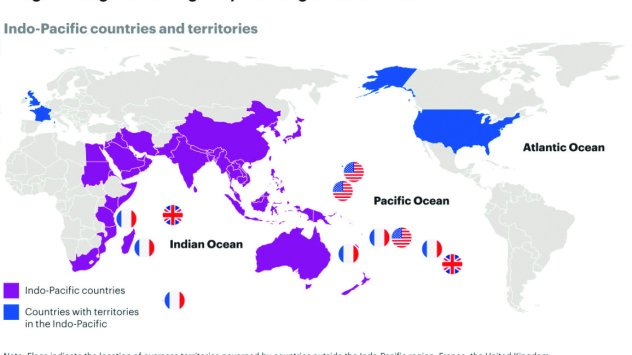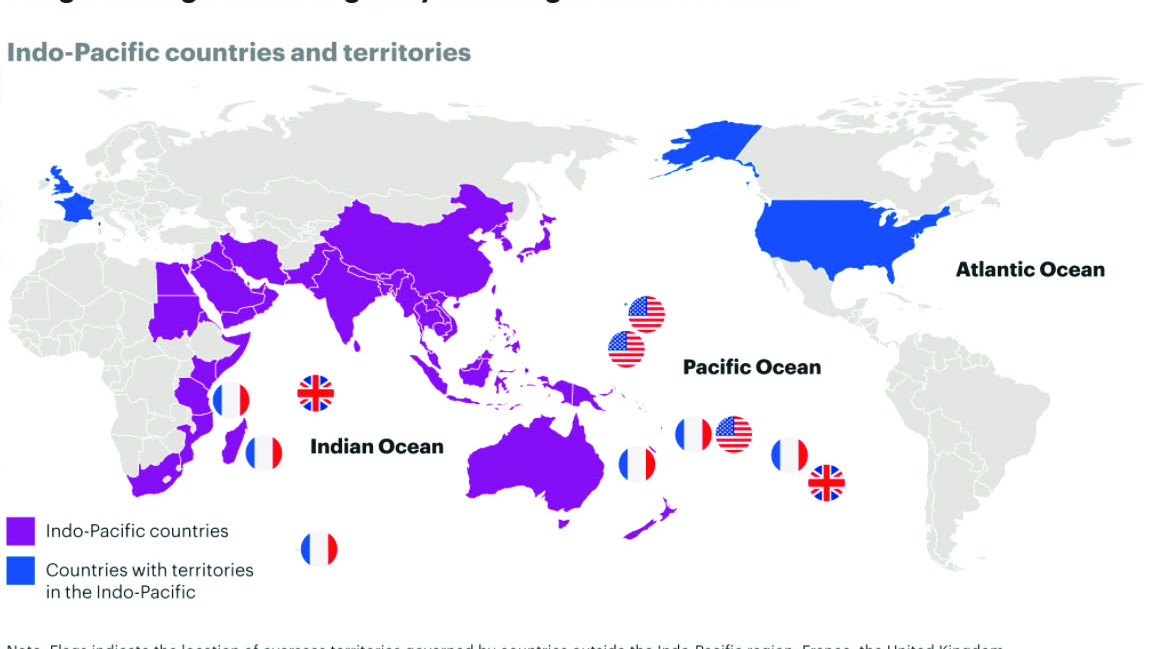
By Martin Tabakov
In the past 2021, the reorientation of American foreign policy attention from the Middle East to that of the Indo-Pacific continued. The activity of the State Department and that of the Department of Defense (Pentagon) in Asia are two markers that mark and justify such a finding.
In the beginning of the last year, the State Secretary Anthony Blinken, along with Lloyd Austin, the Pentagon chief, held 2 + 2 meetings (Secretary of Defense plus Secretary of State) with his Japanese and South Korean counterparts. Austin then went to India, and in mid-December Blinken visited Indonesia and Malaysia. Meanwhile, US Vice President Kamala Harris visited Vietnam and Singapore. And Joe Biden hosted the first face-to-face meeting of the Quadrilateral Security Dialogue, with the Prime Ministers of Australia Scott Morrison, Japan's Yoshihide Suga and India's Narendra Modi.
The goal of this diplomatic activity of Washington was to strengthen and develop the partnership of the United States with the countries of the Quadrilateral Security Dialogue and the Association of Southeast Asian Nations (ASEAN). These diplomatic formats are an important tool for developing US multilateral foreign policy in the region (one might even be tempted to say that these are the two main multilateral pillars of Washington in Asia). And if this energization of American diplomacy towards the Quadrilateral Dialogue had been present during Donald Trump's previous term, the attention that ASEAN received from the Joe Biden administration was qualitatively new.
And if Washington's ambition for the Quadrilateral Dialogue is to gradually add new elements to this cooperation with Canberra, Tokyo and New Delhi so that it gains additional cohesion (without, of course, India and its concept of "strategic autonomy" to be shocked”), The expectations of the Americans towards ASEAN are far more modest. Namely: to provide the countries of Southeast Asia with options, including security and their economies, which are not limited to China (if for years Beijing has been ASEAN's largest trading partner, then during the pandemic and the countries of the organization cumulatively became China's largest trading partner). With such a growing economic symbiosis between China and the ASEAN countries, the organization's desire - to have more freedom in decision-making that corresponds to its centrality as a geopolitical bloc in the region's processes - seems rather desirable.
Of course, relations between the United States and ASEAN have never been easy. And this year is no exception. The military coup in Myanmar, after which Washington imposed sanctions on Naipido, seems to have managed to grade the progress in relations between the United States, on the one hand, Vietnam (in 2018 there landed the American aircraft carrier Carl Vinson) and the Philippines, which, despite repeated threats from President Rodrigo Duterte, did not terminate the agreement to deploy US forces in the country), on the other hand.
The US Defense Department is also active in the Indo-Pacific. Either through its regular joint combat exercises with partner countries (such as Malabar, conducted jointly with the countries of the Quadrilateral Security Dialogue), or through its military deals. The latter include both small ones (Taiwan's sale of M109A6 self-propelled howitzer artillery systems) and large ones (Australia's purchase of nuclear-powered submarines from the United States at the signing of the AUKUS trilateral security pact, in which a third country is the United Kingdom). Both of these deals are particularly sensitive: the one with Taiwan because of China; the one with Australia because of France. And ongoing negotiations are underway for new military-trade agreements (Indonesia can buy F-15EX Eagle II fighter jets, at the expense of the Russian Su-35).
But the conclusion of the aforementioned AUKUS is an example of several things concerning the complete attention of the State Department and the Pentagon towards the Indo-Pacific.
The first thing is the extent to which Washington is ready to introduce the security element into its diplomacy. To this end, risks such as the militarization of the region, such as the reception of AUKUS from some ASEAN countries and China, as well as the harm to the interests of partner countries (such as France), are clearly accepted as admissible. Ensuring free navigation through sea and trade routes (with a major focus on traffic in the South China Sea) is also a priority of US diplomacy, reinterpreted through the prism of security.
The second has to do with placing an explicit emphasis on technology as a key element in building this security. The example of the conclusion of the AUKUS, which deals with the exchange and cooperation in nuclear technology, is an illustrative example, but far from one that exhausts the technological dimension of security, according to Americans. For example, all US partners in the Quadrilateral Security Dialogue - Australia, India and Japan - reject the possibility of using Chinese technology to build their 5G networks. Moreover, Washington, Canberra and Tokyo are in talks to form a "5G coalition" in the South Pacific. Lastly, it shows us that technological security is not only a military interpretation, but also a purely civilian one. And the civic connotation itself has a number of dimensions, including health and supply chains, as evidenced by the Covid-19 pandemic.
Hence, we should not be particular hostages to formulations such as the "alliance of democracies" with which the Joe Biden administration is committed, because behind such an ideological formulation is a much more pragmatic union of countries, which union must meet not only a certain order of values, but also the provision of a technological minimum in terms of ensuring security.
Of course, in order for this "securitization" of foreign policy pursued by the United States to be successful, it is necessary to have partners. In doing so, often partners with sophisticated business cards. Either because they have bilateral discussions with each other (such as those between South Korea and Japan), or because they have established traditions in their interactions with countries that the United States considers rather hostile (such as Indian cooperation, including in the military-industrial sector with Russia).
Despite difficulties of this nature, the United States has time-proven partnerships, albeit with logical modifications, formed since the end of World War II, with Japan, Australia, South Korea and the Philippines. This is the well-known "decades ago" system of San Francisco (also called "Center and Spokes" (Hub and Spokes), in which Washington is the center, and "spokes" are Tokyo, Canberra, etc.). Most clearly, this system can be visualized as the spokes that go to the center of the wheel of a bicycle. To this day, as the architecture of Washington's foreign policy in the region, the Center and Spokes are still relevant today as the United States continues to be the leading center of a system of alliances (or "network of alliances," as the adviser would say). National Security to the White House Jake Sullivan). The obese and clumsy way in which Canberra ruined its diesel submarine deal to reach an alternative agreement with Washington is an eloquent example of the continuing burden and importance of the Americans.
But when it comes to the Center and the Spokes today, there is already a serious stipulation: the Spokes - those key capitals in the region that have close partnerships with the Americans - are developing more and more serious relations with each other. There are more and more examples:
• increased security cooperation, in particular between the Australian and Japanese military;
• the investments that Tokyo is trying to break into Vietnam and the Philippines;
• New Delhi's invitation to Canberra to join Malabar's military exercises in the Quadrilateral Security Dialogue;
• the attempt to reconcile India's East Policy with Japan's Partnership for Quality Infrastructure
In other words, the "spokes" are not what they used to be. For them, there are roads to others that do not necessarily pass through the American center.
But all this is happening not despite, but with the blessing of the United States. This is part of the security franchise (or security delegation) policy that Washington, including due to its limited resources, has increasingly practiced in recent years. For example, when India has been developing military infrastructure on its Andaman and Nicobar Islands for years, guarding the Strait of Malacca, which is of key geostrategic importance to China's hydrocarbon imports, Washington is more than satisfied.
Of course, this American diplomacy, which places a strong emphasis on security, has its limitations. Against this background, China's economically oriented foreign policy seems to be more bountiful and less demanding (in the aforementioned coup in Myanmar, Beijing is rapidly adapting to new realities, unlike Washington). Although India did not want to join the Regional Comprehensive Economic Partnership (RCEP), it remains the largest free trade agreement. Moreover, the previous Donald Trump administration drove the United States out of the Trans-Pacific Partnership (TPP). Combined, these two free trade agreements have worked together: more economic opportunities for Beijing, less for Washington.
On this background, when it comes not to trade but security, the Heartland (according to Halford John Mackinder, one of the founders of geopolitics) of Asia remains the land controlled by the member states of the Shanghai Cooperation Organization (Shanghai). Cooperation Organization (SCO): Russia, China, India, Pakistan, Central Asian countries. Moreover, last year the SCO launched the procedure for admitting Iran to the organization. Add to that the recent and chaotic withdrawal from Afghanistan, and the fact that, despite Taiwan's assurances from Washington, Chinese air force entry into the island's air defense identification area is increasing, not declining.
All this promises not one, but many rods in the spokes of the American bicycle in the Indo-Pacific region.
THE BOTTOM LINE To ensure security in Asia in recent years, the United States has relied on security franchise policy (or security delegation).



